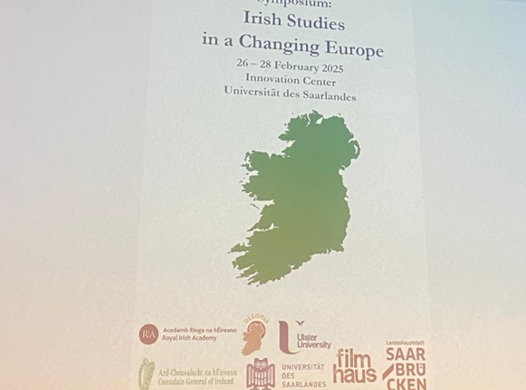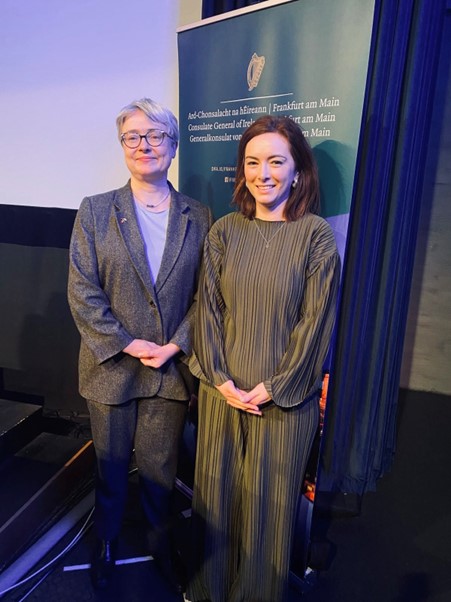Irish Studies in a Changing Europe Symposium
Dr Bronagh Ann McShane, Research Fellow on the VOICES team, recently travelled to Universität des Saarlandes in Saarbrücken, Germany, to present at the ‘Irish Studies in a Changing Europe’ symposium. This gathering of scholars from across disciplines provided an opportunity to explore the evolving landscape of Irish Studies, particularly in a post-Brexit Europe where questions of identity, culture, and academic priorities are becoming increasingly complex.

The symposium opened with a formal address by H.E. Maeve Collins, the Irish Ambassador to Germany, who spoke about the importance of Irish Studies in fostering cultural and academic connections across Europe. Her remarks underscored the evolving nature of Irish identity in a rapidly changing world and the role that scholarship plays in deepening our understanding of these shifts. The opening session also featured a thought-provoking discussion on the Dankebuch of 1946 and the Operation Shamrock exhibition, highlighting the historical ties between Ireland and Germany in the aftermath of the Second World War.
Over the following days, panels covered a diverse range of topics, from medieval Irish poetry and contemporary Irish literature to digital humanities, film, and political history.
I had the opportunity to contribute to these discussions with my presentation, ‘Charting a Path Forward for Irish Women’s History in the Era of AI’, as part of the Digital Humanities panel. My talk showcased the pioneering work of the VOICES team in harnessing AI-driven text recognition and analysis tools to uncover women’s experiences in early modern Ireland. I highlighted how AI provides powerful new methods for processing and interpreting sources that have traditionally been challenging to analyse at scale, revealing patterns and narratives that might otherwise remain obscured. This approach is particularly transformative for women’s history, enabling deeper engagement with overlooked voices and texts.
At the same time, I addressed the challenges that come with integrating AI into historical research, particularly issues of bias in datasets and the importance of maintaining a critical approach when working with algorithmic tools. The discussion following my presentation reinforced the importance of interdisciplinary collaboration between historians and technologists to ensure that AI-driven methodologies enhance rather than distort historical analysis.
One of the key takeaways from both my panel and the broader symposium discussions was the pressing need to adapt Irish Studies to contemporary research challenges. As the field grapples with shifting institutional and funding landscapes and technological innovations, embracing digital methodologies while maintaining rigorous historical inquiry will be essential.

H.E. Maeve Collins, the Irish Ambassador to Germany and Dr Bronagh Ann McShane, VOICES, TCD
Beyond the academic discussions, the symposium was a fantastic opportunity to connect with colleagues, exchange ideas, and consider the future direction of Irish Studies. The event underscored the resilience of the field and the innovative approaches scholars are taking to ensure its continued relevance.
A huge thank you to the symposium organisers at Universität des Saarlandes (Prof. Joachim Frenk and Nadja Freier), Ulster University (Dr Eamonn O Ciardha and Victoria Pearson), and their partners for putting together such a thought-provoking and well-structured event. Their efforts in fostering meaningful discussions and creating a space for collaboration were deeply appreciated.
As we navigate an era of rapid change in Europe, globally and within the academy, it is clear that Irish Studies will continue to evolve. This symposium was a valuable space for reflecting on those changes, and I look forward to seeing how the conversations sparked in Saarbrücken will shape future research and collaborations.